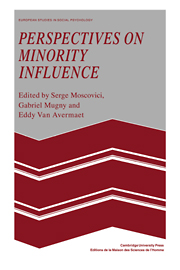Book contents
- Frontmatter
- Contents
- Contributors
- Preface
- Part I The process of minority influence
- Part II Minority influence in groups
- Introduction
- 6 Innovation and socialisation in small groups
- 7 When and how the minority prevails
- 8 The paradox of ‘orthodox minorities’: when orthodoxy infallibly fails
- 9 Conformity, innovation and the psychosocial law
- 10 Infra-group, intra-group and inter-group: construing levels of organisation in social influence
- References
- Subject index
- Author index
7 - When and how the minority prevails
Published online by Cambridge University Press: 05 February 2012
- Frontmatter
- Contents
- Contributors
- Preface
- Part I The process of minority influence
- Part II Minority influence in groups
- Introduction
- 6 Innovation and socialisation in small groups
- 7 When and how the minority prevails
- 8 The paradox of ‘orthodox minorities’: when orthodoxy infallibly fails
- 9 Conformity, innovation and the psychosocial law
- 10 Infra-group, intra-group and inter-group: construing levels of organisation in social influence
- References
- Subject index
- Author index
Summary
In the past decade or so the study of social influence has shifted its focus somewhat from a concern with the determinants of the person's conformity to a majority to an examination of factors that enable a lone dissident individual or a small dissident minority to successfully influence the majority. This work has been spearheaded by Moscovici and his colleagues (see Moscovici, 1976 for an overview of that work) who correctly argue that if the majority always prevailed, society would never change. Change must somehow be instigated initially by those who are out of step with prevailing norms. Supported by research evidence, Moscovici maintains that a key factor in minority success is a consistent, resolute behavioural style which serves to gain the attention of majority members, who are then likely to attribute high confidence and conviction to the members of the dissident group. On the basis of the evidence, there is little doubt that such a minority, even of one, can be a potent force. According to Moscovici, the minority's effect on majority members tends to be internalised as a true information change and is therefore long-lasting. On the other hand, change by a minority member towards the majority is often mere overt compliance, which is typically superficial and fleeting. Such conformity avoids potential group sanctions implicated in normative pressure (Deutsch & Gerard, 1955).
Will a dissident minority always be successful or are certain moderating conditions necessary?
- Type
- Chapter
- Information
- Perspectives on Minority Influence , pp. 171 - 186Publisher: Cambridge University PressPrint publication year: 1985
- 11
- Cited by

